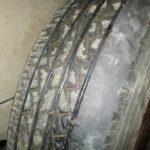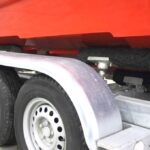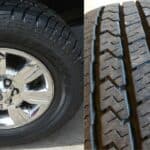When picking out to choosing the right size trailer tire for your needs, there are a few things to keep in mind. The most important factor is the weight of your trailer, as this will determine the amount of stress that will be placed on the tires.
Additionally, you’ll want to consider the type of terrain you’ll be traveling over and the climate conditions you’ll encounter.
You May Like – 16 Inch Tires
With all of these factors in mind, let’s take a look at 16 vs 17.5 trailer tires.
There’s a big debate in the RV world about whether to use 16″ or 17.5″ trailer tires. Here’s a breakdown of the pros and cons of each option:
Pros of 16″ Trailer Tires:
- More affordable than 17.5″ tires
- Lighter weight, which can help with fuel economy
- Better maneuverability thanks to smaller size
- 16″ tires tend to be less expensive than 17.5″ tires.
- 16″ tires typically have a higher load capacity than 17.5″ tires. This means that they can handle more weight, which is important for trailers that are carrying a lot of cargo.
- Finally, 16″ tires may offer a smoother ride than 17.5″ tires since they have a smaller diameter and can absorb bumps better.
Cons of 16″ Trailer Tires:
- 16″ trailer tires may not be compatible with all types of trailers.
Pros of 17.5″ Trailer Tires:
17.5″ trailer tires are becoming increasingly popular due to their many benefits. Some of the pros of 17.5″ trailer tires include:
- Increased Fuel Efficiency: 17.5″ trailer tires are designed to be more aerodynamic than other sizes, which results in increased fuel efficiency. This can save you money on fuel costs over time.
- Improved Towing Performance: 17.5″ trailer tires also offer improved towing performance due to their increased stability and traction. This can be beneficial if you frequently tow heavy loads with your trailer.
- Enhanced Safety: The increased stability and traction of 17.5″ trailer tires can also help to enhance safety while on the road. This is especially important if you plan on doing any long-distance travel with your trailer.
You May Also Like – 17.5 Inch Tires
Cons of 17.5″ Trailer Tires:
- 17.5″ trailer tires they can be more expensive.
- 17.5″ they may not be as widely available as the smaller sizes.
What is the Difference between 16 And 17-Inch Tires?
There are a few key differences between 16 and 17-inch tires that are worth noting.
Firstly, 17-inch tires are generally wider than 16-inch tires. This can provide better handling and stability on the road, as well as a more comfortable ride.
Secondly, 17-inch tires typically have lower profiles than 16-inch tires. This means they have less sidewall flex, which can result in improved performance when cornering and braking.
Finally, 17-inch wheels are usually heavier than 16-inch wheels, which can affect acceleration and fuel economy.

Are Wider Tires Better for Trailers?
There is no definitive answer when it comes to the question of whether wider tires are better for trailers. It ultimately depends on a number of factors, including the specific trailer and its intended use. That said, there are some general benefits that can be associated with using wider tires on a trailer.
For one, wider tires tend to provide more stability than narrower ones. This can be especially beneficial if the trailer is carrying a heavy load or is being towed over uneven terrain.
Additionally, wider tires can help to distribute weight more evenly, which can also improve stability and reduce wear and tear on the tires themselves.
Another potential benefit of using wider tires on a trailer is that they may offer better traction than narrower ones. This can be helpful in situations where the trailer might otherwise have difficulty gaining traction, such as when pulling away from a stop or navigating slippery conditions.
Ultimately, whether or not wider tires are better for trailers depends on the individual circumstances. However, there are some clear advantages that make them worth considering for many applications.
17.5 Trailer Tire Upgrade
When you’re seeking to upgrade the trailer tires on your vehicle, bear in mind that are a few things you need to take into consideration.
First and foremost, what is the primary purpose of your trailer? If you’re using it for general everyday transportation, then you’ll want to focus on finding a tire that offers a good mix of traction, durability and comfort.
However, if you’re using your trailer for more specialized purposes such as hauling heavy loads or off-road adventures, then you’ll need to prioritize those attributes accordingly.
Once you know what you need from your new tires, it’s time to start shopping around. There are a variety of different sizes and types of trailer tires on the market, so it’s important to do your research before making a purchase.
You can start by checking out online reviews from other customers who have purchased similar products. This will give you a good idea of which brands and models are most popular and why. Once you’ve narrowed down your options, it’s time for a test drive (or two).
If possible, try to borrow or rent a trailer with the same type of tires you’re interested in so that you can get a feel for how they perform in real-world conditions. Pay attention to factors like ride quality, braking performance and overall handling while driving on both paved and unpaved surfaces.
Finally, when it comes time to make your purchase, be sure to compare prices between different retailers before settling on one particular store or brand.
By taking the time to do all of this research ahead of time, you can be sure that you’re getting the best possible deal on new trailer tires for your needs.
Are 17-Inch Wheels Better Than 16-Inch Wheels?
The debate between 16-inch and 17-inch wheels is a long-standing one in the world of automotive enthusiasts. Both have their pros and cons, but ultimately it comes down to a matter of personal preference. Here, we’ll take a closer look at both sizes to help you make a decision for your own vehicle.
16-inch wheels are typically lighter than 17-inch wheels, which can improve fuel economy and handling. They’re also less expensive to replace if they’re damaged. On the downside, 16-inch tires tend to wear out more quickly than larger ones, so you’ll have to replace them more often.
They also don’t provide as much grip on the road, so your car may not handle as well in icy or wet conditions.
17-inch wheels offer better performance overall than 16-inch wheels. The extra size provides improved grip and handling, especially in slippery conditions.
They also cause less tire wear since there’s more surface area in contact with the ground. However, all that extra metal means that 17-inch wheels are significantly heavier than their smaller counterparts, which can negatively impact fuel economy and acceleration.
17.5 Trailer Wheels 9/16” Studs
Are you in the market for new trailer wheels? If so, you may be wondering what size to get. Trailer wheels come in a variety of sizes, and the size that is right for your trailer depends on a few factors.
One factor to consider is the width of your trailer’s axle. Another factor to consider is the weight capacity of the wheel. The width of your trailer’s axle will determine the maximum width for your wheel, and the weight capacity of the wheel will need to be greater than or equal to the total weight of your trailer and its contents.
When it comes to choosing a specific size, 17.5″ x 9/16″ is a popular option for trailers with 8-lug axles. This size has become increasingly popular in recent years because it offers a good balance between strength and stability while still being light enough that it won’t add too much weight to your trailer.
And, since 9/16″ is such a common stud size, you shouldn’t have any trouble finding lug nuts that fit.
Are 16 Or 17-Inch Wheels Better for off Road?
There is no definitive answer to this question as it depends on a number of factors, such as the type of off-roading you will be doing and the specific vehicle you are using.
However, in general, larger wheels (such as 16 or 17-inch) may be better for off-road driving as they can provide more ground clearance and allow for bigger, more aggressive tires.
Additionally, larger wheels may also help improve traction and stability when driving on rough terrain.
17.5 Wheels
Whether you’re looking for a new set of wheels for your car, truck or SUV, you can’t go wrong with 17.5 wheels. These wheels are designed to provide a smooth ride and superior handling, making them the perfect choice for any driver.
17.5 wheels are available in a variety of sizes and styles to suit any vehicle, so you’re sure to find the perfect set for your needs. Plus, with their affordable price tag, 17.5 wheels are a great value for your money.
So if you’re in the market for a new set of wheels, be sure to check out 17.5 wheels. You won’t be disappointed with the performance or the value!
Moreover, 17.5″ wheels are the most popular size for semi-trucks and RVs. They offer a balance of strength and weight, and can be used with a variety of tire sizes. If you’re looking for new wheels for your truck or RV, 17.5″ is a great option to consider!
How to Choose the Boat Trailer Tires?
Boat trailer tires are an important part of towing your boat. They provide the necessary traction and support for your boat and trailer while you are driving. There are a few things to keep in mind when choosing the right tires for your boat trailer.
The first thing to consider is the size of the tire. Boat trailers come in different sizes, so you will need to make sure that you get the right size tire for your particular trailer. The next thing to think about is the load capacity.
Make sure that the tires you choose can handle the weight of your boat and trailer.
This will help to prevent flat spots from forming on the tires and will also help with gas mileage. Finally, take a look at the tread on your tires. If they are starting to wear down, it might be time for new ones.
13 Inch Trailer Tires
If you’re shopping for new tires for your trailer, you may be wondering what size to get. Trailer tires are available in a variety of sizes, but one of the most popular choices is the 13 inch tire. Here’s a look at some of the things you should know about 13 inch trailer tires before making your purchase.
13 inch trailer tires are a great option for many trailers. They offer a good balance of size and stability, and can be used on a variety of different types of trailers. If you’re not sure what size tire is right for your trailer, it’s always best to consult with a professional to ensure you get the perfect fit.
When shopping for 13 inch trailer tires, you’ll find that there are two main types: bias ply and radial. Bias ply tires have crisscrossing layers of fabric that run diagonally across the tire, while radial tires have layers that run perpendicular to each other.
Both types have their own advantages and disadvantages, so it’s important to choose the right type for your needs.
Radial trailer tires are more expensive than bias ply tires, but they offer better handling and durability. Bias ply tires are less expensive and provide a smoother ride, but they aren’t as durable as radial trailer tires.
Ultimately, the decision between radial and bias ply comes down to personal preference and budget.
Whatever type of tire you choose, make sure it has a load rating that matches or exceeds the weight capacity of your trailer. It’s also important to choose a tire with proper tread depth for the conditions in which you’ll be using your trailer – deeper treads are better for off-road use while shallower treads work well on paved surfaces.
Finally, don’t forget to check the air pressure in your 13 inch trailer tires regularly!
Underinflated or overinflated tires can cause problems on the road so it’s important to keep an eye on them (or invest in a quality tire pressure monitoring system).
Travel Trailer Tires
It is no secret that RV tires are expensive. A set of four can cost upwards of $1,000, so it is important to take care of them. Here are some tips on how to prolong the life of your travel trailer tires:
-Store your trailer in a covered area when not in use. This will protect the tires from sun damage and premature aging.
-Check the air pressure in the tires regularly. Underinflated tires are more likely to overheat and fail.
-Do not overload your trailer. The added weight puts unnecessary strain on the tires and suspension system.
-Be mindful of speed bumps, potholes, and other obstacles when driving. Hitting these too hard can cause tire damage. By following these simple tips, you can help extend the life of your travel trailer tires and save yourself some money in the long run!
Best Trailer Tires
There are many factors to consider when choosing the best trailer tires for your needs. The type of trailer, the weight of your load, and the amount of use you plan on putting them through all play a role in determining which tires will work best for you.
Here is a look at some of the different types of trailer tires available and what they offer:
–Ply rating: This indicates how strong the tire is and how well it will hold up under heavy use. A higher ply rating means a stronger tire that can handle more weight.
–Load range: This tells you how much weight each tire can safely carry. Be sure to choose a tire with a load range that exceeds the weight of your fully loaded trailer.
–Speed rating: This indicates how fast the tire can safely go. If you plan on using your trailer on the highway, be sure to choose a tire with a high speed rating.
Conclusion of 16 Vs 17.5 Trailer Tires
There are many factors to consider when deciding whether to upgrade from 16-inch trailer tires to 17.5-inch tires. The most important factor is the weight of your trailer. If you have a lightweight trailer, there’s no need to upgrade to larger tires.
However, if your trailer is on the heavier side, upgrading to 17.5-inch tires will give you better handling and stability on the road. Other factors to consider include the size of your rims and the type of terrain you’ll be driving on. Ultimately, it’s up to you to decide what’s best for your specific situation.


















